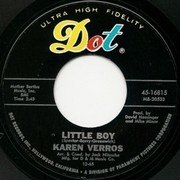 If anyone is thinking of sending a belated Christmas present, I am
missing a few Jack Nitzsche records. Marry Clayton’s “The Doorbell Rings"
(Teldisc), Johnny Gamboa "Why Lover" / "She's Never There" (Star Revue)
and Karen Verros "You Just Gotta Know My Mind" (Dot) among them. All
three 45s, in different ways and with very different appeal are excellent
examples of Jack Nitzsche's work. Not having stumbled across the first
two 45s isn't that surprising, small labels, small pressing run and
both having a big appeal to certain obsessive record collectors. The
monetary value attached to the Karen Verros 45 though does cause me
to raise an eyebrow. A comparatively large record label, the A-side
is readily available on The Jack Nitzsche Story Vol.2, but twice I've
been outbid on eBay for sums way beyond what I'd be willing to pay.
Lacking the psychedelic appeal, apparently Karen's other 45 on Dot is
even harder to come by. I bought my copy in heaven, well the nearest
I've come to it so far, a record shop in Orange County for $4, back
in the late 70s. So, as my belated Christmas gift, Nitzsche's second
go at arranging a song he helped make famous with La La Brooks, The
Crystals, Spector, Greenwich and Barry, "Little Boy". If you've been
really good boys and girls I'll play the flip side in a month or two.
If anyone is thinking of sending a belated Christmas present, I am
missing a few Jack Nitzsche records. Marry Clayton’s “The Doorbell Rings"
(Teldisc), Johnny Gamboa "Why Lover" / "She's Never There" (Star Revue)
and Karen Verros "You Just Gotta Know My Mind" (Dot) among them. All
three 45s, in different ways and with very different appeal are excellent
examples of Jack Nitzsche's work. Not having stumbled across the first
two 45s isn't that surprising, small labels, small pressing run and
both having a big appeal to certain obsessive record collectors. The
monetary value attached to the Karen Verros 45 though does cause me
to raise an eyebrow. A comparatively large record label, the A-side
is readily available on The Jack Nitzsche Story Vol.2, but twice I've
been outbid on eBay for sums way beyond what I'd be willing to pay.
Lacking the psychedelic appeal, apparently Karen's other 45 on Dot is
even harder to come by. I bought my copy in heaven, well the nearest
I've come to it so far, a record shop in Orange County for $4, back
in the late 70s. So, as my belated Christmas gift, Nitzsche's second
go at arranging a song he helped make famous with La La Brooks, The
Crystals, Spector, Greenwich and Barry, "Little Boy". If you've been
really good boys and girls I'll play the flip side in a month or two.
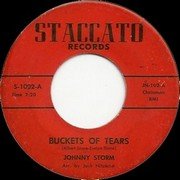 Released on Jack Nitzsche's own record label, Staccato, the artist
name on the label is Johnny Storm. From the opening "I cried some
buckets full of tears..." Johnny Storm is without doubt another
nom-de-plume for Albert Stone. The disc is fairly beaten-up but as
it's the only copy I have seen, or, until recently, knew existed.
I'm not complaining, once you give it a listen I don't think you will
be either. The lyrics and bluesy beat are a throw-back to the despairing
rhythm & blues style, perfected so well in the fifties by Leiber
& Stoller. As with L & S's vocal couplets, despite, perhaps
because of, the abject misery of the lyrics, you can't help smiling.
This guy isn't sad, he's desperate, wailing and screaming in total
misery while the tears course down his face, a vocal tour-de-force.
What brings this side bang up-to-date, for the early 60s, is Jack
Nitzsche's arrangement. The music only heightens the pathos. The same
skill that at the end of the decade was to unnerve; actually terrify,
you in his score for "Performance" was already evident.
The female backing vocalists, uncredited of course, but possibly include
a future star of "Performance", namely the young Merry Clayton.
Their gospel-tinged response to Johnny’s grief completes the desolation.
Released on Jack Nitzsche's own record label, Staccato, the artist
name on the label is Johnny Storm. From the opening "I cried some
buckets full of tears..." Johnny Storm is without doubt another
nom-de-plume for Albert Stone. The disc is fairly beaten-up but as
it's the only copy I have seen, or, until recently, knew existed.
I'm not complaining, once you give it a listen I don't think you will
be either. The lyrics and bluesy beat are a throw-back to the despairing
rhythm & blues style, perfected so well in the fifties by Leiber
& Stoller. As with L & S's vocal couplets, despite, perhaps
because of, the abject misery of the lyrics, you can't help smiling.
This guy isn't sad, he's desperate, wailing and screaming in total
misery while the tears course down his face, a vocal tour-de-force.
What brings this side bang up-to-date, for the early 60s, is Jack
Nitzsche's arrangement. The music only heightens the pathos. The same
skill that at the end of the decade was to unnerve; actually terrify,
you in his score for "Performance" was already evident.
The female backing vocalists, uncredited of course, but possibly include
a future star of "Performance", namely the young Merry Clayton.
Their gospel-tinged response to Johnny’s grief completes the desolation.
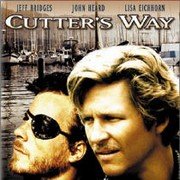 I share Ian Penman's view that "Cutter's Way" was the apex of Nitzsche's accomplishments, both as an author of film music and as a composer, full stop. This unsettling and poignant music was perhaps the best evocation of what Nitzsche once described as the emotions living in the cracks between the piano keys. The score was written for a quixotic and terrifyingly effective ensemble, comprising glass harmonica, harpsichord, bowed saw and the Armin Family's electric string quartet. Recorded by a then-unknown Daniel Lanois at his Grant Avenue Studios, the sessions for Nitzsche's score introduced Lanois's name to a larger public before Brian Eno entered the picture. Between the cloudiness of a Harry Partch tone poem and a mariachi band's brassy sentimentality, Nitzsche carved a space in which courage, tragedy and suicidal pluck could coexist. Incidentally, Leo Kottke's self-titled 1977 debut on Chrysalis works as a companion volume for the "Cutter's Way" score. in a better world this would have been billed as a duo effort, so integral are Nitzsche's arrangements to the album's form and mien. And always, the sound of his strings, so unique even when playing deceptively simple unison lines: strings were Nitzsche's sonic thumbprint, every bit as immediately recognisable from the very first note as a mid-70s lee Perry Production.
I share Ian Penman's view that "Cutter's Way" was the apex of Nitzsche's accomplishments, both as an author of film music and as a composer, full stop. This unsettling and poignant music was perhaps the best evocation of what Nitzsche once described as the emotions living in the cracks between the piano keys. The score was written for a quixotic and terrifyingly effective ensemble, comprising glass harmonica, harpsichord, bowed saw and the Armin Family's electric string quartet. Recorded by a then-unknown Daniel Lanois at his Grant Avenue Studios, the sessions for Nitzsche's score introduced Lanois's name to a larger public before Brian Eno entered the picture. Between the cloudiness of a Harry Partch tone poem and a mariachi band's brassy sentimentality, Nitzsche carved a space in which courage, tragedy and suicidal pluck could coexist. Incidentally, Leo Kottke's self-titled 1977 debut on Chrysalis works as a companion volume for the "Cutter's Way" score. in a better world this would have been billed as a duo effort, so integral are Nitzsche's arrangements to the album's form and mien. And always, the sound of his strings, so unique even when playing deceptively simple unison lines: strings were Nitzsche's sonic thumbprint, every bit as immediately recognisable from the very first note as a mid-70s lee Perry Production.
Richard Henderson
(Excerpt of a piece originally published in WIRE.)
(I Can't Get No) Satisfaction
Backing Track
Andrew Loog Oldham's book '2Stoned', the vastly entertaining sequel
to 'Stoned', continues his trawl through the 60s as he lived it. Chronicled
by ALO, as well other participants in those heady times, he has quite
a lot to say about recording The Rolling Stones "(I Can't Get No)
Satisfaction".
He describes earlier attempts at nailing what was to prove to be The
Stones major breakout track around the world as hardly rising above
the scumline or, of a later cut, "as if the Stones had done a version
of the 1963 'Walk Right In' by The Rooftop Singers. This version called
for striped shirts, Brylcreem, basket ball slacks and a time-out"
This was to change though when the Stones had another go at the track
in RCA's recording studio in Hollywood.
Now I'm not that blinkered in my appreciation of Jack Nitzsche to put ALL the success of the resulting 45 down to him but... According to ALO, as well as "the magical fuzz" and "bed of acoustic guitars" laid down by Keith Richard; "Jack Nitzsche played a stellar non-intrusive piano that glued the elements into that comfortable place." I've related this tale a number of times. Only problem is, as I've been told and my ears confirmed, you can't hear any piano on 'Satisfaction'!
Well, until now that is. With grateful thanks to a 'keeper of the faith'
music lover who wishes to remain anonymous, the backing track has been
made available to us. On this you can clearly hear Nitzsche's piano
and understand ALO's appreciation of the role he played in the recording.
Enjoy!

 Jack's seventh, and last, single for Reprise Records was the usual eclectic mix of styles and sounds. "African Waltz", written and originally recorded by Canadian Galt McDermot (later to be best remembered for the musical 'Hair') in 1956 and made famous (or nearly) by Johnny Dankworth and Cannonball Adderley who both took their versions to the mid point of the U.S. charts in 1961, was given a tad more uptempo treatment and, if anything to my ears, actually improved on the 'originals' for that. Whilst still retaining its jazz roots, Jack's take on the tune gave it a whole brighter sound, even adding in some rock 'n' roll echoes along the way. But flip it over and behold "Gringo", a Jim Balcom(e)/Art Laboe tune that The Champs or Bobby Rey should have killed for. Both had their 1958 composition "Corrido Rock" in mind for sure when they wrote this piece, complete as it is rebel yells, Latin Rock styling and catchy trumpet phrasing throughout. There’s also a nod in the direction of Herb Alpert who was cornering the 'Mexicali brass' market by the time this single came out in 1965. All of that said, it's almost certain that 'Gringo' was the filler track while Jack and Reprise felt 'African Waltz' was ready for another trip to chartdom. Sadly, as we now know, this was not to be.
Jack's seventh, and last, single for Reprise Records was the usual eclectic mix of styles and sounds. "African Waltz", written and originally recorded by Canadian Galt McDermot (later to be best remembered for the musical 'Hair') in 1956 and made famous (or nearly) by Johnny Dankworth and Cannonball Adderley who both took their versions to the mid point of the U.S. charts in 1961, was given a tad more uptempo treatment and, if anything to my ears, actually improved on the 'originals' for that. Whilst still retaining its jazz roots, Jack's take on the tune gave it a whole brighter sound, even adding in some rock 'n' roll echoes along the way. But flip it over and behold "Gringo", a Jim Balcom(e)/Art Laboe tune that The Champs or Bobby Rey should have killed for. Both had their 1958 composition "Corrido Rock" in mind for sure when they wrote this piece, complete as it is rebel yells, Latin Rock styling and catchy trumpet phrasing throughout. There’s also a nod in the direction of Herb Alpert who was cornering the 'Mexicali brass' market by the time this single came out in 1965. All of that said, it's almost certain that 'Gringo' was the filler track while Jack and Reprise felt 'African Waltz' was ready for another trip to chartdom. Sadly, as we now know, this was not to be.
Austin Powell

 I thought it may be off interest to see the German picture cover and the Cashbox review kindly supplied by Harry Young. Interestingly the review shows 'Gringo' as the intended a-side but by the time the 45 had crossed the Atlantic 'African Waltz' was the intended hit.
I thought it may be off interest to see the German picture cover and the Cashbox review kindly supplied by Harry Young. Interestingly the review shows 'Gringo' as the intended a-side but by the time the 45 had crossed the Atlantic 'African Waltz' was the intended hit.
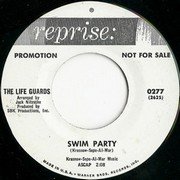 "Swim Party" was issued as the B-side of the 1964 single "Swimtime USA" by the Life Guards on Reprise. Bearing the writing credits of Krasnow-Sepe-Al-Mar the tune was seemingly a perfect example of the type of throwaway instrumental Jack Nitzsche could cut in the studio in a matter of seconds. Frantic use of castanets and some hot sax and guitar work really got the party going.
"Swim Party" was issued as the B-side of the 1964 single "Swimtime USA" by the Life Guards on Reprise. Bearing the writing credits of Krasnow-Sepe-Al-Mar the tune was seemingly a perfect example of the type of throwaway instrumental Jack Nitzsche could cut in the studio in a matter of seconds. Frantic use of castanets and some hot sax and guitar work really got the party going.
However, despite writing credits associated with the hustling trio of
Martin Brooks, Robert Krasnow and Tony Sepe, "Swim Party" bears a striking
melodic resemblance to a similarly titled demo by local pop commandos
Phil Sloan and Steve Barri – the song being one of the duo's many early
songwriting efforts that were tied in with the current swim dance craze.
Perhaps not so coincidentally Sloan-Barri had not only written the Reprise
A-side, "Swimtime USA", but also donned imaginary swimwear when masquerading
vocally as the Life Guards.
As for the duo’s own demo of "Swim Party", the somewhat low production
value was more than compensated by Sloan's energetic vocal. Who can
resist an opening line like "Dig that Suzy! Hey, what a dish. She knows
how to move and she acts like a fish."? It is a shame that Sepe, Brooks
and Krasnow, listed jointly as producers under the SBK Productions moniker,
and Nitzsche, who arranged the session, did not enlist Sloan to also
sing on the B-side bound "Swim Party". A good song that obviously could
and should have been further developed was thus relegated to throwaway
status.
Martin Rovang
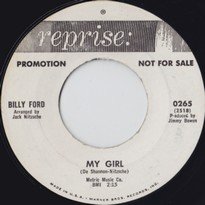 Bob Lind's concert at The Luminaire was the best show I've seen since...
ooh Jackie DeShannon's at Dingwalls. Both songwriters were signed to
Metric Music and are still pals. Before Bob flew out for his gigs he
gave Jackie a call to ask how her UK trip had been. I'm sure it was
positive, I know both performers are thrilled at the reception they
received from their UK fans. The warmth of this greeting was due not
only to the respect accorded their classic material as writers and performers
but also for their work as contemporary artists, which has lost none
of its passion or relevance. Jack Nitzsche’s empathy served as a catalyst
to both, and the body of work these three contributed to popular music
is awe-inspiring. Guess I'm pleased to note that all the Bob Lind -
Nitzsche recordings are available on CD, so I won’t be playing them
here, go buy 'em. But a few gems from the Jackie DeShannon - Nitzsche
catalogue have escaped the silver discs. One of my favourites is this
massive soul blast, written Nitzsche - DeShannon, arr by Nitzsche and
sung by the powerfully voiced Billy Ford, (who may or may not have had
releases dating back to '51). Amazingly I've not been able to turn up
any other records by him after "My Girl" but the quality of this and
its equally impressive flip, a version of "This Is Worth Fighting For"
hold out the hope that other cuts remain in the can.
Bob Lind's concert at The Luminaire was the best show I've seen since...
ooh Jackie DeShannon's at Dingwalls. Both songwriters were signed to
Metric Music and are still pals. Before Bob flew out for his gigs he
gave Jackie a call to ask how her UK trip had been. I'm sure it was
positive, I know both performers are thrilled at the reception they
received from their UK fans. The warmth of this greeting was due not
only to the respect accorded their classic material as writers and performers
but also for their work as contemporary artists, which has lost none
of its passion or relevance. Jack Nitzsche’s empathy served as a catalyst
to both, and the body of work these three contributed to popular music
is awe-inspiring. Guess I'm pleased to note that all the Bob Lind -
Nitzsche recordings are available on CD, so I won’t be playing them
here, go buy 'em. But a few gems from the Jackie DeShannon - Nitzsche
catalogue have escaped the silver discs. One of my favourites is this
massive soul blast, written Nitzsche - DeShannon, arr by Nitzsche and
sung by the powerfully voiced Billy Ford, (who may or may not have had
releases dating back to '51). Amazingly I've not been able to turn up
any other records by him after "My Girl" but the quality of this and
its equally impressive flip, a version of "This Is Worth Fighting For"
hold out the hope that other cuts remain in the can.
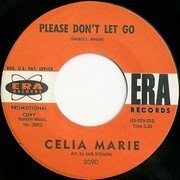 Michael Gleisner wrote to the site;
Michael Gleisner wrote to the site;
"I happened by your website and found, much to my delight, a performer
who is very much dear to my heart and to whom I know quite well. You see, Celia Marie happens to be my mother with her
actual name being Maria Celia Felix (maiden). She was born in California but raised in both Glendale and Tucson, AZ (she
now resides in a suburb of Phoenix). She continued singing throughout her long career (lounges) and became quite a
talented and professional jazz vocalist. Her powerful voice had matured considerably and coupled with her sophisticated
phrasing and electric improvisation, she was strongly reminiscent of, and often likened to, the great Nancy Wilson. She
truly was something else to hear in person but unfortunately she no longer performs. I was so happy to have found
something written about her."
Celia Marie's "Please Don't Let Go" and her Previous ROTW cut "Walk With Me" both display the strength of her vocal.
Just the one 45rpm was issued but hers is an interesting, albeit typical,
story of a shady manager, lots of hard work for scant financial reward
and young love. Certainly too much info to fit into the format of the
ROTW. I'll collate the stories told to me by Michael and feature them
soon in the 'Records Review' section of the site.
 Texans - Green Grass Of Texas - Infinity 001
Texans - Green Grass Of Texas - Infinity 001(25/05/07)Jack Nitzsche - Green Grass Of Texas - Reprise 20 337

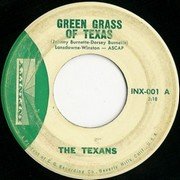 I received a email regarding the Prod.
Ron Barrett pages from Andreas (Andi) Grabsch. He pointed out a
spelling mistake and had a question or two. As a companion to his main
"Good Golly Miss Molly" site, Andi has some pages devoted to the writer
of many classic Little Richard records John Marascalco and his label
Infinity
Records. I'm afraid my German isn't that hot, but it looks an interesting
site with a growing collection of Infinity
label scans. Ron Barrett had a 45 released on that label and Jack
Nitzsche arranged a rather coveted 'Northern Soul' release for Billy
Storm. I shared with Andi my hunch that Jack Nitzsche may have arranged
the first release on the label, The Texans' (commonly accepted as being
Johnny and Dorsey Burnette) "Green, Green Grass Of Texas". I'm a bit
of a sucker for instrumentals and like this a lot; I was 'shocked' at
Andi's response which was "totally simplistic... There is not really
any arrangement... Do you really like it?!". Maybe there aren't many
musical gymnastics, unless you count the way the track builds, I do,
but as mentioned in my last ROTW review the track sounds 'right'. Nitzsche
himself covered the tune a couple of years later on Reprise, with a
similar arrangement but apparently he felt the need to woosh it up a
bit. And here we do get a bit of 'trademark Jack Nitzsche' sweetening.
I received a email regarding the Prod.
Ron Barrett pages from Andreas (Andi) Grabsch. He pointed out a
spelling mistake and had a question or two. As a companion to his main
"Good Golly Miss Molly" site, Andi has some pages devoted to the writer
of many classic Little Richard records John Marascalco and his label
Infinity
Records. I'm afraid my German isn't that hot, but it looks an interesting
site with a growing collection of Infinity
label scans. Ron Barrett had a 45 released on that label and Jack
Nitzsche arranged a rather coveted 'Northern Soul' release for Billy
Storm. I shared with Andi my hunch that Jack Nitzsche may have arranged
the first release on the label, The Texans' (commonly accepted as being
Johnny and Dorsey Burnette) "Green, Green Grass Of Texas". I'm a bit
of a sucker for instrumentals and like this a lot; I was 'shocked' at
Andi's response which was "totally simplistic... There is not really
any arrangement... Do you really like it?!". Maybe there aren't many
musical gymnastics, unless you count the way the track builds, I do,
but as mentioned in my last ROTW review the track sounds 'right'. Nitzsche
himself covered the tune a couple of years later on Reprise, with a
similar arrangement but apparently he felt the need to woosh it up a
bit. And here we do get a bit of 'trademark Jack Nitzsche' sweetening.
Andi sent an email, as well as promising to get his labels scans up on the site, he supplied a web link to an excellent Johnny & Dorsey Burnette discography. It confirms The Texans were the Burnette brothers AND lists a '59 release date. This does seem to rule out a Nitzsche arrangement but why was the release delayed for two/three years? And with no actual recording date or studio information given, I cling to my hope!
The mail continues to arrive regarding Jack Nitzsche's theme music
for '9½ Weeks'. The latest, from Paco in Spain, contained an
intriguing YouTube link. Entitled "Ending Music from 9½ Weeks"
it's a beautiful piano piece, excellently presented by 'Parkthoven'.
Play the YouTube video and then give a listen to Nitzsche's actual theme
which I've taken from the DVD, entitled "By The Time I Count To 50".
Coming at the end of Elizabeth (Kim Basinger) and John (Mickey Rourke)'s
passionate love affair it's easy to understand the emotional strings
Jack's music is playing with. Just watch and listen to films as varied
in subject matter as Performance, Stand By Me, Hard Workin’ Man, One
Flew Over The Cuckoo’s Nest and Starman, among many others, and without
always realising, your feelings have been shaped by a master. The music
doesn’t scream Nitzsche rather, as with his arranging and producing,
whatever mood the film, song or artist needs, Jack’s magic creates it.
He had his insecurities, but this self-doubt never seemed to cause him
to question his musical talent, nor did he feel the need to be 'in the
face' of listeners with a kind of "hey, you're listening to Jack Nitzsche",
'trademark wiz-bang'.
So what happens? You leave the movie theatre desperate to relive the
moment, buy the soundtrack and be bitterly disappointed. Instead of
heart-wrenching melodies you get pop-pap. There's nothing wrong with
the chart hits but, as my post bag shows, it's Jack Nitzsche's music
that helps reflect the drama on screen. And, sadly in the case of "Nine
And A Half Weeks", this remains not only unavailable but the themes
unnamed.
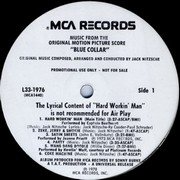 I
was sure that the new Jack Nitszche CD comp, "Hard Workin' Man", would
include the rare 'obscene' version of the title cut from the film "Blue
Collar". But contact with this website confirmed that the whale got
away again, making me, apparently, the only person on the planet who
has an official audio issue of this alternate vocal.
I
was sure that the new Jack Nitszche CD comp, "Hard Workin' Man", would
include the rare 'obscene' version of the title cut from the film "Blue
Collar". But contact with this website confirmed that the whale got
away again, making me, apparently, the only person on the planet who
has an official audio issue of this alternate vocal.
I dug my copy out of a thrift store box in New York, where promotional
copies of almost anything were very common until Reagan changed the
charity tax laws. It is on an advanced copy of the entire soundtrack
LP (see scan). This only figures for a Captain Beefheart item, as his
career was littered with issues on labels just starting out (Buddah,
Blue Thumb, Straight, Bizarre) that had troubled distribution. This
superior version, almost unheard, was only sent to radio stations who
would be legally incapable of broadcasting it unless they censored it
themselves, so those few who actually got a copy probably tossed it
immediately. I have literally the only copy I have ever seen or know
of among Beefheart aficionados. To give you a whiff, the singer is grappling
with a 'shit ass foreman' and is a 'hard workin' fucked over man'.
The recording in any version is very interesting anyway as a reunion
between Beefheart and Ry Cooder (who quit the "Safe As Milk" Magic Band
just before they were to play The Monterey Pop Festival) although, as
the backing track is identical on both versions of the song, they may
not have actually performed in the studio together.
It may never see the light of CD but not to despair - this version actually
begins the film, which is on DVD (the rarest version is actually the
censored obscene version made for American television broadcasts). The
DVD recording is marred somewhat by machinery sound effects and a bit
of dialogue overlaid at the end; but the film is excellent if extremely
downbeat, so twice worthy of purchase - until someone finally gets their
hands on it for a CD issue.
John Ellis
John Ellis is a longtime devotee of Captain Beefheart and has written articles for Goldmine & Forced Exposure, among other publications.
He's also hosted several annual Beefheart birthday radio shows (on which he played the offending cut once) for WNYC's "Plastic Tales from the Marshmallow Dimension". He is the author of plays about Marc Blitzstein, 'Blitzstein Strikes Back', and 'On Will to Love', the rather obscene love story buried in Shakespeare's sonnets.
Thanks John for the review and suppling the label scan and mp3.
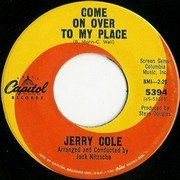 Jerry Cole's cover of Mann-Weil's "Come On Over to My Place" manages
to make The Drifters' original sound soulful. The Drifters might not
have too much to worry about in the vocal department but for a overtly
pop record this is prettty good, especially as it's the b-side. Sax,
hand- claps, girly chorus, bouncy beat, there's even a mouth-organ in
there. What, besides dubbed party noises, could possibly make for a
more fun, good-time record? Like it or not, after a couple of plays
it spends the rest of the day swimming around your head. I'm of the
opinion that Dave Walton's recording of the A-side, "Every Window In
The City" is better served by Irving Martin's production than Jack Nitzsche's
arrangement. But Mr. Cole has been coming in for even more stick
on Spectropop recently. Despite being one of the busiest session players
on the West-Coast, recording under his own name and various pseudonyms,
Cole has apparently taken the credit for recordings he wasn't involved
in. I have a lot of sympathy for Mr. Cole, ask me what I did yesterday
and I'm likely to draw a blank, let alone 20, 30 or 40 odd years ago!
Even Jack Nitzsche when asked about "You've Lost That Loving Feeling"
commented that he "felt" like he'd arranged it!
Jerry Cole's cover of Mann-Weil's "Come On Over to My Place" manages
to make The Drifters' original sound soulful. The Drifters might not
have too much to worry about in the vocal department but for a overtly
pop record this is prettty good, especially as it's the b-side. Sax,
hand- claps, girly chorus, bouncy beat, there's even a mouth-organ in
there. What, besides dubbed party noises, could possibly make for a
more fun, good-time record? Like it or not, after a couple of plays
it spends the rest of the day swimming around your head. I'm of the
opinion that Dave Walton's recording of the A-side, "Every Window In
The City" is better served by Irving Martin's production than Jack Nitzsche's
arrangement. But Mr. Cole has been coming in for even more stick
on Spectropop recently. Despite being one of the busiest session players
on the West-Coast, recording under his own name and various pseudonyms,
Cole has apparently taken the credit for recordings he wasn't involved
in. I have a lot of sympathy for Mr. Cole, ask me what I did yesterday
and I'm likely to draw a blank, let alone 20, 30 or 40 odd years ago!
Even Jack Nitzsche when asked about "You've Lost That Loving Feeling"
commented that he "felt" like he'd arranged it!
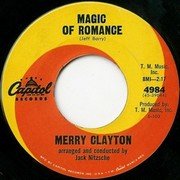 Hitching a ride on the coat-tails of Laura Pinto's enjoyable Spectropop
article Mr
Music Man - A Glimpse into the Life and Career of Jeff Barry is
a solo Barry composition, "Magic Of Romance". I guess for most of us,
as soon as Barry's name is mentioned, the mind automatically links to
Ellie Greenwich, or if you're groovy, maybe Tony Powers, Artie Resnick
and Andy Kim squeeze in, but rarely, if we're thinking 'Brill Building
Pop', does Barry’s solo writings get much of a look in. "Magic Of Romance",
unlike his desperately sad "Anyone But You" by Ruth Brown (produced
Phil Spector) or the sneering "You Ain't As Hip As All That, Baby" by
Jay and The Americans, is lyrically at least, classic Greenwich/Barry.
The young Merry Clayton glorifies the feeling of being in love while
the Blossoms, more conservatively, egg her on in the chorus with a ‘shoo-bee-doo-bee-magic’
refrain - echoing the shoop-shoop of its more illustrious a-side flip
"It’s In His Kiss". The rinky-dink production and the restrained arrangement
doesn’t really do it for me but it's a good song and it's easy to understand
why there was so much excitement about Merry Clayton’s vocal prowess.
Hitching a ride on the coat-tails of Laura Pinto's enjoyable Spectropop
article Mr
Music Man - A Glimpse into the Life and Career of Jeff Barry is
a solo Barry composition, "Magic Of Romance". I guess for most of us,
as soon as Barry's name is mentioned, the mind automatically links to
Ellie Greenwich, or if you're groovy, maybe Tony Powers, Artie Resnick
and Andy Kim squeeze in, but rarely, if we're thinking 'Brill Building
Pop', does Barry’s solo writings get much of a look in. "Magic Of Romance",
unlike his desperately sad "Anyone But You" by Ruth Brown (produced
Phil Spector) or the sneering "You Ain't As Hip As All That, Baby" by
Jay and The Americans, is lyrically at least, classic Greenwich/Barry.
The young Merry Clayton glorifies the feeling of being in love while
the Blossoms, more conservatively, egg her on in the chorus with a ‘shoo-bee-doo-bee-magic’
refrain - echoing the shoop-shoop of its more illustrious a-side flip
"It’s In His Kiss". The rinky-dink production and the restrained arrangement
doesn’t really do it for me but it's a good song and it's easy to understand
why there was so much excitement about Merry Clayton’s vocal prowess.
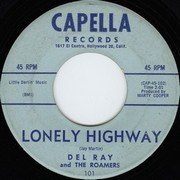 In Stephen McParland's book, "Surf Music U.S.A.", he quotes John Blair's
sleeve notes from "Cowabunga! The Surf Box":"The melody of 'The Lonely
Surfer' is very similar to that of 'The Lonely Highway' by Del Ray And
The Roamers, issued on Capella 101 in July, 1960." Intrigued, a
web search led me to Dick Rosemont's Originals
Project site. With lots of info and obscure records it's easy to
spend a few hours wandering around and whilst there do check to see
if you can help him out his with 'wants list'. Dick kindly supplied
the label scan and mp3 used here and yes, the melody of "Lonely Surfer"
and "Lonley Highway" is VERY similar. This isn't quite as surprising
as it may at first seem. Marty Cooper co-writer, along with Jack Nitzsche,
of "The Lonely Surfer", was, as revealed on Marty
Cooper Producer‘s site the owner of Capella Records, Little Darlin',
his music publishing company, and he's the producer. I've since sent
Marty Cooper an mp3 of ”Lonely Highway" and he's confirmed that Jay
Martin, the listed writer, is in fact him using an alias.
In Stephen McParland's book, "Surf Music U.S.A.", he quotes John Blair's
sleeve notes from "Cowabunga! The Surf Box":"The melody of 'The Lonely
Surfer' is very similar to that of 'The Lonely Highway' by Del Ray And
The Roamers, issued on Capella 101 in July, 1960." Intrigued, a
web search led me to Dick Rosemont's Originals
Project site. With lots of info and obscure records it's easy to
spend a few hours wandering around and whilst there do check to see
if you can help him out his with 'wants list'. Dick kindly supplied
the label scan and mp3 used here and yes, the melody of "Lonely Surfer"
and "Lonley Highway" is VERY similar. This isn't quite as surprising
as it may at first seem. Marty Cooper co-writer, along with Jack Nitzsche,
of "The Lonely Surfer", was, as revealed on Marty
Cooper Producer‘s site the owner of Capella Records, Little Darlin',
his music publishing company, and he's the producer. I've since sent
Marty Cooper an mp3 of ”Lonely Highway" and he's confirmed that Jay
Martin, the listed writer, is in fact him using an alias.
Gary Myers in a Spectropop message suggested an even earlier blueprint for "The Lonely Surfer".
"I always figured "The Lonely Surfer" was inspired by
Duane Eddy's "Lonely One" from 1959 - take the
latter's 1st 4 notes, but repeat the 2nd one (do),
then raise the 5th melody note 1/2 step and change
the chord from vi to bVII."
Stephen McParland passed on an email regarding this ROTW from John Blair, I've quoted from part of it: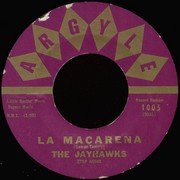 "Both sides of the Capella 101 single were reissued on Argyle 1005 as by The Jayhawks!!!! Marty Cooper ---> Jay Martin ---> Jayhawks, I suppose. Attached are label scans of both sides. Notice that "Lonely Highway" is written by Jay Martin, but "La Macarena" is by George Temple (also published by Little Darlin'). However, the same track on the Capella single is by A.O. Calero & B.B. Monterde and published by Peer International. OK....."La Macarena" (the better side, IMO) is subtitled "The Bull Fight Song" on the Capella single, but not on the Argyle release. While I'm not sure when the Argyle single was released, it was almost surely later than the Capella single, which has a delta number (June/July, 1960). For a 1960 guitar instrumental, there's enough reverb used on "La Macarena" to put it in the "proto-surf" category".
John Blair
"Both sides of the Capella 101 single were reissued on Argyle 1005 as by The Jayhawks!!!! Marty Cooper ---> Jay Martin ---> Jayhawks, I suppose. Attached are label scans of both sides. Notice that "Lonely Highway" is written by Jay Martin, but "La Macarena" is by George Temple (also published by Little Darlin'). However, the same track on the Capella single is by A.O. Calero & B.B. Monterde and published by Peer International. OK....."La Macarena" (the better side, IMO) is subtitled "The Bull Fight Song" on the Capella single, but not on the Argyle release. While I'm not sure when the Argyle single was released, it was almost surely later than the Capella single, which has a delta number (June/July, 1960). For a 1960 guitar instrumental, there's enough reverb used on "La Macarena" to put it in the "proto-surf" category".
John Blair
Interesting stuff! John supplied the attached label scan which for limited period is 'click to play', it really is a cool number with a great production. I have written to Marty Cooper for more information but haven't received a reply as yet. Argyle operated during 1961, I've found five other releases, without any obvious Cooper involvement, that seem to be reissue's of earlier rock'n'roll sides. BMI lists the writers of "La Macarena" as Bautista Monterde Bernardino & Calero Ortiz Antonio but for "Macarena" a third writers name is added, Dorothy Dodd. I assume it's a 'standard' Spanish/Mexican tune, any further info gratefully received! Stephen McParland adds an amusing PS.
"Dorothy Dodd is Australian (or at least was living here - I never met her). Many years ago, when I was working as a land surveyor, the guy I was working with belonged to a local lawn bowls club. Every year they held a musical revue and Dorothy was the person who organised and wrote for it! She wrote the English lyrics for Granada and probably did a similar job for La Maracena!"
Stephen McParland
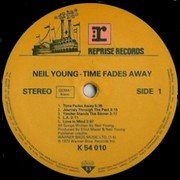 Great 'lost' albums...part 436: Neil Young "Time Fades Away" (Reprise 2151)
Great 'lost' albums...part 436: Neil Young "Time Fades Away" (Reprise 2151)
Peace, love and who gives a shit about understanding? Hippie Neil Young
pissed people off from the outset, and his latest release, "Living With
War", demonstrates that he hasn't lost the touch. Throughout his career
he has seemed determined to test the loyalty of his legion of fans with
every new record and concert; "Time Fades Away" was and remains one
of his most contentious. After Young's stint with Buffalo Springfield,
three successful solo LPs (particularly the praise afforded "Harvest")
and work with Crosby, Stills, Nash & Young, the fans and critics
were beginning to think that perhaps they did understand him. Consternation,
anger, bewilderment and yes, to a few, delight greeted the 'Time Fades
Away' tour and subsequent LP. Instead of performing what was expected,
a 'Greatest Hits' package, his set was made up of not only mainly new
material but the angry angst was 'country' without any good time feel.
Tales of the tour, as described in Jimmy McDonough's biography, "Shakey",
make for harrowing reading and certainly following the dismissal (and
subsequent death) of Danny Whitten from the rehearsal sessions it couldn't
have got off to a worse start. The remaining musicians, dubbed The Stray
Gators, were talented but largely un-tested, at least in performing
on stage, with Mr. Young. (Continued in Part 2)
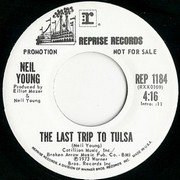 continued... Neil Young’s starring role extended to a separate
floor at the hotels the group shared, turning up late for rehearsals
and often being the worse for wear on tequila. The band wrangled over
money, struggled to cope with Young’s inconsistent musical demands and
they all shared the stress of the tour. Add to this tense and volatile
mix Mr. Jack Nitzsche, whose behaviour, caused among other things by
frustration at Young's un-professionalism, was bizarre in the extreme.
Young asked his buddies David Crosby and Graham Nash to help, but although
they eased Young's vocal burden they didn't help the mood of the tour,
both having their own problems. Due perhaps to unpleasant memories of
the tour, Young has no love for the LP and has vetoed a CD release.
Actually though the material stands comparison with Young's major works.
The barely suppressed rage, Young’s cracked vocal and the naked beauty
of tracks like "Journey Through The Past" (solo Young on vocal
and piano) make for compelling listening. The album has been reassessed
by critics and fans alike and an on-line petition
has been set up pleading for a CD release. Young's quite a collector
himself; sure he'll understand his fans request. Can we expect a "Time
Fades Away" (with bonus 45rpm cuts such as "The Last Trip to Tulsa")
CD? I wouldn’t hold my breath! Jimmy McDonough's "Shakey" has the most
innaresting stories I’ve read of the tour but there is lots of stuff
to be found on the web.
continued... Neil Young’s starring role extended to a separate
floor at the hotels the group shared, turning up late for rehearsals
and often being the worse for wear on tequila. The band wrangled over
money, struggled to cope with Young’s inconsistent musical demands and
they all shared the stress of the tour. Add to this tense and volatile
mix Mr. Jack Nitzsche, whose behaviour, caused among other things by
frustration at Young's un-professionalism, was bizarre in the extreme.
Young asked his buddies David Crosby and Graham Nash to help, but although
they eased Young's vocal burden they didn't help the mood of the tour,
both having their own problems. Due perhaps to unpleasant memories of
the tour, Young has no love for the LP and has vetoed a CD release.
Actually though the material stands comparison with Young's major works.
The barely suppressed rage, Young’s cracked vocal and the naked beauty
of tracks like "Journey Through The Past" (solo Young on vocal
and piano) make for compelling listening. The album has been reassessed
by critics and fans alike and an on-line petition
has been set up pleading for a CD release. Young's quite a collector
himself; sure he'll understand his fans request. Can we expect a "Time
Fades Away" (with bonus 45rpm cuts such as "The Last Trip to Tulsa")
CD? I wouldn’t hold my breath! Jimmy McDonough's "Shakey" has the most
innaresting stories I’ve read of the tour but there is lots of stuff
to be found on the web.
 Robert Downey, (no, not him, not Junior but his dad) first made a
name for himself in New York in the 60s with short B/W art-house films.
Putney Swope, released in 1970, was his feature-length writing and directorial
debut. It was a satirical, anti-racial piece and it may have been filmed
on the cheap but it made enough of an impression at the box-office to
garner proper backing for his next project, “Greaser's Palace". The
anarchic Downey could not fail to have been intrigued by Jack Nitzsche's
unnerving score for "Performance" and he approached him for his planned
blockbuster. Denny Bruce in his essay for Rhino HandMade's "Three Piece
Suite - The Reprise Recordings 1971-1974" recalls their meeting and
subsequent work and friendship. "Jack and Robert became the best
of friends... After "Greaser’s Palace" was 'in the can' they both came
back to L.A....In late '73 he and Downey were trying to get financing
for another movie...Mo [Ostin] decided to give Jack and Downey a shot
at working on a Jack Nitzsche solo album”. Downey and Nitzsche's
movie "Sticks And Bones" (which I've not seen) came out soon after "Greaser's
Palace". Their LP release had to wait until 2001 but "Jive aka Moment
To Moment" the film I guess they tried to get backing for, was distributed
in '76. Maybe not as lush as planned, it is an interestingly bizarre
L.A. character piece, matched by Nitzsche's score. The music and sounds
- many that had previously been, or were soon to be, heard in different
forms - are mainly split (as is the film) into tantalising 'moments'.
Here are a few of the segments. Please excuse the sound quality.
Robert Downey, (no, not him, not Junior but his dad) first made a
name for himself in New York in the 60s with short B/W art-house films.
Putney Swope, released in 1970, was his feature-length writing and directorial
debut. It was a satirical, anti-racial piece and it may have been filmed
on the cheap but it made enough of an impression at the box-office to
garner proper backing for his next project, “Greaser's Palace". The
anarchic Downey could not fail to have been intrigued by Jack Nitzsche's
unnerving score for "Performance" and he approached him for his planned
blockbuster. Denny Bruce in his essay for Rhino HandMade's "Three Piece
Suite - The Reprise Recordings 1971-1974" recalls their meeting and
subsequent work and friendship. "Jack and Robert became the best
of friends... After "Greaser’s Palace" was 'in the can' they both came
back to L.A....In late '73 he and Downey were trying to get financing
for another movie...Mo [Ostin] decided to give Jack and Downey a shot
at working on a Jack Nitzsche solo album”. Downey and Nitzsche's
movie "Sticks And Bones" (which I've not seen) came out soon after "Greaser's
Palace". Their LP release had to wait until 2001 but "Jive aka Moment
To Moment" the film I guess they tried to get backing for, was distributed
in '76. Maybe not as lush as planned, it is an interestingly bizarre
L.A. character piece, matched by Nitzsche's score. The music and sounds
- many that had previously been, or were soon to be, heard in different
forms - are mainly split (as is the film) into tantalising 'moments'.
Here are a few of the segments. Please excuse the sound quality.
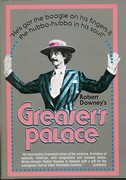 Around the time Jack Nitzsche was recording his solo LP, "St. Giles
Cripplegate", working live and on record with Neil Young and Crazy Horse,
recording with The Stones and Buffy St. Marie, he was hanging about
with new buddy, Robert Downey. I'll play some of their stuff from "Moment
To Moment" next, but in the meantime, how's about this rocking boogie
woogie from the film "Greaser's Palace"? In the film Jack can be glimpsed
playing guitar, but I'd like to think for the recording he's the one
hammering the keys.
Around the time Jack Nitzsche was recording his solo LP, "St. Giles
Cripplegate", working live and on record with Neil Young and Crazy Horse,
recording with The Stones and Buffy St. Marie, he was hanging about
with new buddy, Robert Downey. I'll play some of their stuff from "Moment
To Moment" next, but in the meantime, how's about this rocking boogie
woogie from the film "Greaser's Palace"? In the film Jack can be glimpsed
playing guitar, but I'd like to think for the recording he's the one
hammering the keys.
Feb'05-Nov'05 * Dec 05-Dec'06 * Jan 07-




